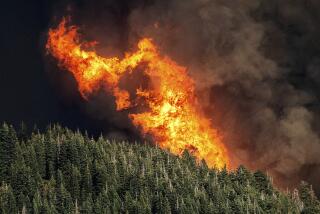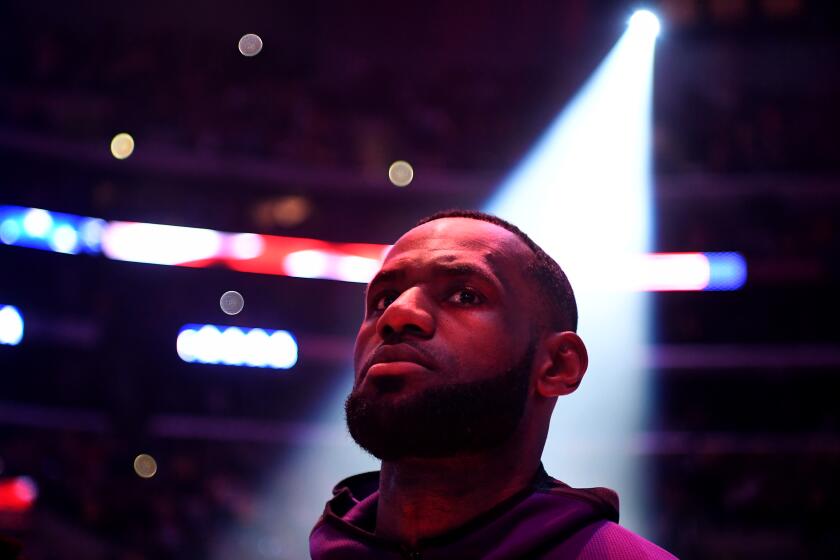To These Muslims, Saddam and War Are Distant Indeed
- Share via
Out of the mouths of babes. . . .
It’s early afternoon and playground time under a bright blue California sky. A couple dozen 5-year-olds are dividing their well-earned recess time among romping on the modern-day version of a Jungle Jim set, zooming down a slide and testing their courage on bucket-seat swings.
As the sportscasters like to say, their futures are ahead of them.
“Look at them,” says Sami Khan, administrator of the Orange Crescent School, an Islamic worship and study center in Garden Grove. “They’re very innocent. They don’t know what’s happening, to tell you the truth. They don’t know who Saddam Hussein is. They don’t know what war is.”
These aren’t especially good days for Khan. Things are weighing heavily on his mind. With war in the Middle East and with his Muslim constituency wanting to make sure their kids are safe in school, Khan is feeling the pressure. The older students are talking about the war; some have not been able to do so without crying. And Khan has had some other administrative decisions to make--already he’s roped off part of the school grounds, the part bordering a street, just to make sure kids aren’t playing out there in the event someone throws a rock or bottle from a passing car.
You never know, he says.
Are you sure that even the younger kids don’t know about Saddam, I asked. For some reason, I have the feeling that even 5-year-old Muslim kids know about Arab leaders.
“Why don’t you ask one?” he says.
He motions Yosef Ahmed over to talk. He’s 5, informing us very politely that his birthday is Oct. 26. He has a brother who’s 3.
Do you like games, I ask him.
“I like Monopoly. My mom was going to get me one at Christmas, but she forgot.”
I ask if there’s any particular aspect of the game he’s really good at, and he concedes, rather modestly, that he’s “good at the whole game. I also like to play Easy Money.”
Yosef says he reads three books a week, on different subjects. For 5 years old, he seems about as good a combination of brightness and innocence and politeness as any parent could ask for.
Do you know that the country is having trouble now, I ask him.
He nods.
Do you know what war is, I ask. What do you think of it?
“War is a bad thing,” he says. “I’m afraid. I’m afraid of war. I’m scared of fighting. It’s a bad thing.”
Do you know who Saddam Hussein is?
He shakes his head, no.
Do you know who George Bush is?
“The president of the United States.”
Do you know who the vice president is?
“He’s with the United States.”
Yosef says he doesn’t have any advice for President Bush and eventually lets on that his main priority in life is “to play as much as I can.” With that, he runs off, making a beeline for the swing set.
“I told you,” Khan says. “If I were his parents, I wouldn’t want him to have that kind of fear, to have those feelings.”
Yosef and the other 300 students at the school are taught about Christianity and Judaism in addition to their training in Islam, Khan says. The older students in the school obviously talk about the war, but it’s too distant a concept for the younger ones, Khan says.
We talk about the innocence of the kids and for a moment or two, we picture a school ground of Iraqi children who, unlike these American kids, are hearing the sound of warplanes and feeling the concussion from American bombs.
“See what impression they will carry with them in the future,” Khan asks, referring to Iraqi children. “Hatred.”
He says it sadly.
On the playground, the students are getting ready to return to class. They assemble in orderly lines and march back inside.
We watch them prance around merrily, and Khan says: “I’m in chains. You’re in chains. They’re free. I like their freedom. I feel more concerned about ourselves because we have to earn a living, take care of a family. They’re not worried about those things. They’re enjoying life. Eat, drink and play. We should learn something from them. See how cheerful they are.”
Dana Parsons’ column appears Wednesday, Friday and Sunday. Readers may reach Parsons by writing to him at The Times Orange County Edition, 1375 Sunflower Ave., Costa Mesa, Calif. 92626, or calling (714) 966-7821.
More to Read
Go beyond the scoreboard
Get the latest on L.A.'s teams in the daily Sports Report newsletter.
You may occasionally receive promotional content from the Los Angeles Times.










